Editor’s note: We’re republishing this essay from sci-fi legend Ursula K. Le Guin this week. Le Guin wrote ‘Riding the Avalanche’ for us last year, examining e-publishing and the state of the book industry.
NWBL will publish a few repeats this month while we work on a re-design of our site. Look for a re-launch in June with a new look and a new cast of bookseller contributors!
Just a couple of years ago I wrote that I thought the next big step in publishing would be print-on-demand. My prophecy failure rate continues to be perfect. We’re going direct to e-publication. And we’re going there very fast, in great disorder, riding an electronic avalanche.
I thought p.o.d. would dominate, because e-reading devices didn’t seem to be making much headway. Some people do use p.o.d., some are willing to read on their computers, some even practice palm-reading with Blackberries and such, but the leap over p.o.d must be largely due to the fact that usable e-readers are at last being widely produced. Now they need to be improved in quality and to come way down in price.
I don’t think print on paper will vanish any more than the pencil vanished when we started typing. The physical document is irreplaceably useful and durable. To think electronic storage can replace it is mere techno-hubris. But it looks as if, within a few years, most popular and ephemeral works, maybe most books of all kinds, will be published electronically and not on paper.
My personal reactions to this prospect:
As a reader, anything longer than a letter or a poem is tiresome for me to read on the screen. I read fast, carelessly, superficially on the screen, and don’t enjoy it. I don’t know why. I’ve composed on the computer for years now; I can edit on it fine; I can write on it for pleasure. Why can’t I read on it for pleasure?
For one thing, I like to read lying down.
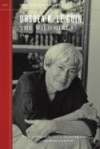 Maybe if I had a nice, light reader that didn’t have multiple functions for every button, didn’t do a damn thing but show me clear text on two facing full-sized pages, I’d soon be able to lie down with it and “sink into” it as I do into print on paper. We are an adaptable species, and habit changes everything.
Maybe if I had a nice, light reader that didn’t have multiple functions for every button, didn’t do a damn thing but show me clear text on two facing full-sized pages, I’d soon be able to lie down with it and “sink into” it as I do into print on paper. We are an adaptable species, and habit changes everything.But at this point, I’ll read what I can on paper, and make do with text on screen only if I have to.
As a professional writer making my living from my work, I’m a bit spooked. Once they saw faster profit in e-books than in print, big corporation-owned publishers started making grabs for e-rights, such as claiming that a book contract that didn’t explicitly mention rights for which the technology didn’t yet exist gave them, retrospectively, to the publisher. Now the contractual terms, advances, and royalties for e-books are all being worked out ad hoc and in a rush. At the moment, royalties, from the author point of view, look very good. But nobody seems entirely clear about how it will work. Publishers, agents, authors, we’re all riding the avalanche.
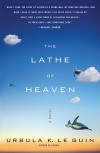 As for copyright, I am very worried. At this point the Web crawls with pirates offering copyrighted work for sale as e-publications, usually in badly degraded form; threatening them with copyright violation is just playing Whack-a-Mole, and nobody’s even trying to invoke the law on them. The Copyright Office has a huge job just keeping up with paper publication, and no clout in Congress. We saw Google’s success in shortcircuiting copyright (by getting some libraries to provide them copyrighted books to copy, by treating “orphaned” books as if they were books out of copyright, by claiming to release only “snippets,” a term even less definable than “fair use” is, and so on.) Judge Chin’s ruling against the Google Settlement does not, I fear, keep Google from leading the pirate fleet. Does copyright law end where the Web begins? Who will enforce it? Or what will replace it, enabling writers to live by their work?
As for copyright, I am very worried. At this point the Web crawls with pirates offering copyrighted work for sale as e-publications, usually in badly degraded form; threatening them with copyright violation is just playing Whack-a-Mole, and nobody’s even trying to invoke the law on them. The Copyright Office has a huge job just keeping up with paper publication, and no clout in Congress. We saw Google’s success in shortcircuiting copyright (by getting some libraries to provide them copyrighted books to copy, by treating “orphaned” books as if they were books out of copyright, by claiming to release only “snippets,” a term even less definable than “fair use” is, and so on.) Judge Chin’s ruling against the Google Settlement does not, I fear, keep Google from leading the pirate fleet. Does copyright law end where the Web begins? Who will enforce it? Or what will replace it, enabling writers to live by their work?
As an author sharing responsibility for the state of my art, I fear control of availability (and of course content) by the corporations. Amazon’s offering only Amazon-owned books for their Kindle reader was an example. Books are not commodities, and readers are not consumers, but the corporations, cultureless, with no ethical guidelines,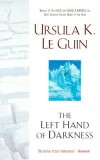 nothing but their own profit growth in view, will treat them as such so long as they are allowed to. A public kept in ignorance isn’t likely to even notice.
nothing but their own profit growth in view, will treat them as such so long as they are allowed to. A public kept in ignorance isn’t likely to even notice.
I welcome e-publication, so long as it works like an immense new-and-used bookstore network including bookstores selling both paper and e-books—and so long as it is fully and freely hooked up with the public libraries. The almost total failure of our schools to teach literature is causing a disastrous break in cultural continuity; many young people have read nothing written before 1990 or even 2000. E-publication offers vast availability and accessibility to older texts via our libraries.
Finally, as a very old author, I’m glad to see some of my longtime commercial publishers riding out the avalanche—battered, yes, but so far so good. And I rejoice in linking up when I can with smaller publishing houses on the West Coast, paper or electronic or both—about as far away from the corporations as you can get, these days. It’s like buying local produce. A bit gritty around the roots, maybe, but it tastes like it used to.
Le Guin credits her son, Theo Downes-Le Guin, for his ideas and suggestions for this essay. “Anyone my age needs a native informant from the computer generation,” she says. Le Guin’s latest book, The Wild Girls, is available in paperback from the small independent publisher PM Press. The book packages Nebula winner The Wild Girls, newly revised and presented in book form for the first time, with Le Guin’s scorching Harper’s essay, “Staying Awake While We Read.”
Le Guin needs no introduction here. She has published twenty-two novels, eleven volumes of short stories, three collections of essays, twelve books for children, six volumes of poetry and four of translation, and has received many awards: Hugo, Nebula, National Book Award, PEN-Malamud, the Pacific Northwest Booksellers Award (in 1986 for Always Coming Home and a Lifetime Achievement Award in 2001) and many others. Her recent publications include a volume of poetry, Incredible Good Fortune, the novel Lavinia, and an essay collection, Cheek by Jowl. She lives in Portland.


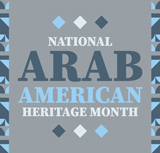
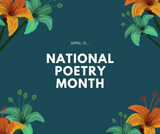
I think you’re 100% right that books aren’t vanishing anytime soon.
The copyright issue is huge. At least, Judge Chin’s ruling is finally going in the right direction.
You touched on my biggest fear, ownership of our collective past. Libraries in the Western world are under organized threat. If anyone wants access to history or the classics in the Corporate future then you’ll have to pay. Google talks about an electronic library, yet when you read the fine print, they’re talking about an on-line store, not a library.
Yet, I also feel this is a great time to be a writer. People want a good read. They want quality entertainment. Right now the number of book, writing and theatrical groups are expanding, it seems everywhere. This year I’ve been to two ‘meet the writer’ promotions at my library and two author tours at McNally Robinson’s in Winnipeg. I’ve attended four live ‘radio’ plays. I believe that those seeking quality self-publsihing, plus authors carried by small and medium presses and publishers (not-corporate owned) are the future. It’s just getting there. Any suggestions?
Lovely description of small press publishing. Appreciate your honesty in this article. Your work taught me SF could be so much more than about changes in technology.
I am a book lover who began reading before age 3. I work as a writer. I also have a visual processing problem that makes reading very slow. My electronic reader enabled me to get through about four times as many books in the past year than I read in previous years, and I have found I retain more information than I do from printed books. Reading from a “window” rather than from two facing pages has made all the difference.
I’ve been writing ebooks for seven years now. Thank you for a balanced and clear article. You hit all the points of concern without the flailing “ZOMG! They’re coming for my library!” note of panic that often taints such articles.
Epub is exciting for a lot reasons. It allows specialty authors and smaller niches to find their market. How small? I consider any book of mine that sells 500 copies to be a roaring success. On the other hand, getting the rights back can be a pain, fighting pirates (not the fun sort like my fictional ancestor) is constant and time-consuming.
But at the end of the day, most readers want a paper book, something they can return to time and again, if they decide a book is a keeper. Ebooks are great for ephemera, novels you’ll read once, enjoy and forget. I think this shows in that romance is one of the hottest fields in e-pub. Besides, e-books are hard to sign!
So, when/where can I (in the UK) buy Always Coming Home as an eBook (kindle or .EPUB)?
Dear Ms. Ford,
It looks like the publisher (Univ of California Press) has not yet made the book available in an eBook format. My guess is that it will within the next year or so. There is a nice preview of the book from Google eBooks at http://www.indiebound.org/book/9780520227354, on the Indiebound site. Perhaps that will hold you until the full version is released. Thanks for asking, and thanks for reading NW Booklovers!!
Thom
That was a good read! Ironically, I will be PRINTING it out to share with my writers group. We often have this discussion. And you know, you can’t have meetings without paper, unless everyone has the same iPad or e-reader or – Star Trek-like device.
Oddly, I used to say the exact same things about ereaders. I got a newer Kindle and a nice cover. Now I hate reading paper books because I have to hold them open, keep track of a bookmark, and can’t turn the page by pressing a side button. I went back to re-read a favorite trilogy recently in large trade paperback. Got so aggravated I downloaded the set for my Kindle.
How did I ever find my place after falling asleep and dropping the book on the floor?
I do adore my books. I love the titles I keep handy lined up on my shelves like family photographs. I guess, for me, it was a matter of finding a habit-rhythm. 🙂
I prefer real books too and I like reading in the bath, sometimes asleep. It´s very expensive to repair a e-reader falling in the water. I like the books standing in my shelves.
We have noticed the upsurge in sales of eBook versions as well. At first, print versions and Kindle versions were pretty much selling neck-in-neck. However, there must be a lot of folks who don’t want to wait for that print version to arrive, or perhaps our new plugged-in Generation E wants that particular book NOW, even if they have to read it on screen.
Still, it’s a mystery to me why folks would settle for the e-version of a book when they can hold that beautiful dead-tree version in their hands. In any case, I think Le Guin hit the nail on the head with her essay on this one.
I love books. I always will. . . . But I have discovered as my eyes age, even after cataract surgery supposedly corrected my vision to 20/10 (reading glasses required) that I love the “Adjust Type Size” feature on my Kindle. I have purchased Kindle copies of paper books I own because they were printed in too fine a type size. On the other hand, I have no qualms about purchasing a paper copy of a book I own on Kindle — especially if I have a chance to get the author to sign it!
[…] Le Guin (no introduction necessary) recently sounded off on the pros and cons of digital publishing. Hers are valid points – for one thing, the copyright […]